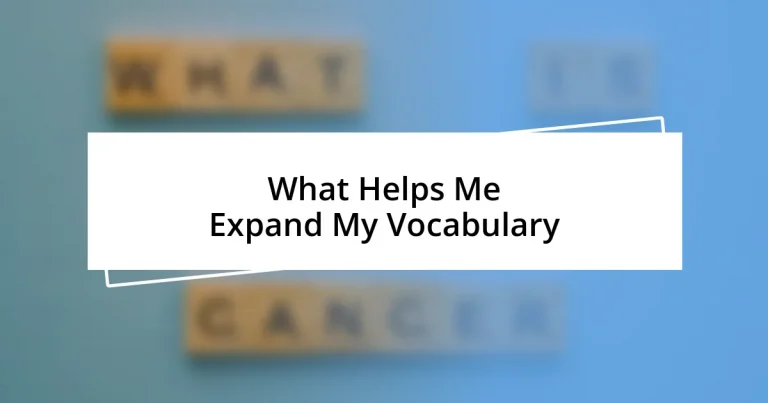Key takeaways:
- Consistent reading and diverse literature expose learners to new vocabulary in context, enhancing understanding and appreciation of language.
- Engaging with vocabulary apps gamifies learning, making it interactive while catering to different learning styles.
- Practicing writing and maintaining a vocabulary journal deepens language comprehension and fosters creativity.
- Conversational practice and language exchanges provide cultural insights and reinforce vocabulary through real-life application.

Understanding vocabulary expansion techniques
One effective technique I’ve found in enhancing my vocabulary is through consistent reading. I remember when I first picked up a classic novel; I encountered words that left me puzzled but also intrigued. It was as if each page beckoned me to discover new meanings, igniting a passion for language that I hadn’t realized was there. Does that resonate with you?
Another method that has worked wonders for me is keeping a vocabulary journal. Whenever I stumble upon a new word, I jot it down along with its definition and an example sentence. This practice transforms ambiguity into clarity, and I often find myself revisiting my notes, reinforcing my memory. Have you ever experienced the joy of recalling a word just at the right moment during a conversation? It can be exhilarating!
Lastly, I can’t stress enough the importance of using new words in my daily conversations. It initially felt intimidating, but using those newfound words not only solidifies my understanding but also enhances how I express my thoughts. What’s more engaging than sharing fresh vocabulary with friends and seeing their reactions? It’s a powerful way to connect and make communication even more vibrant.
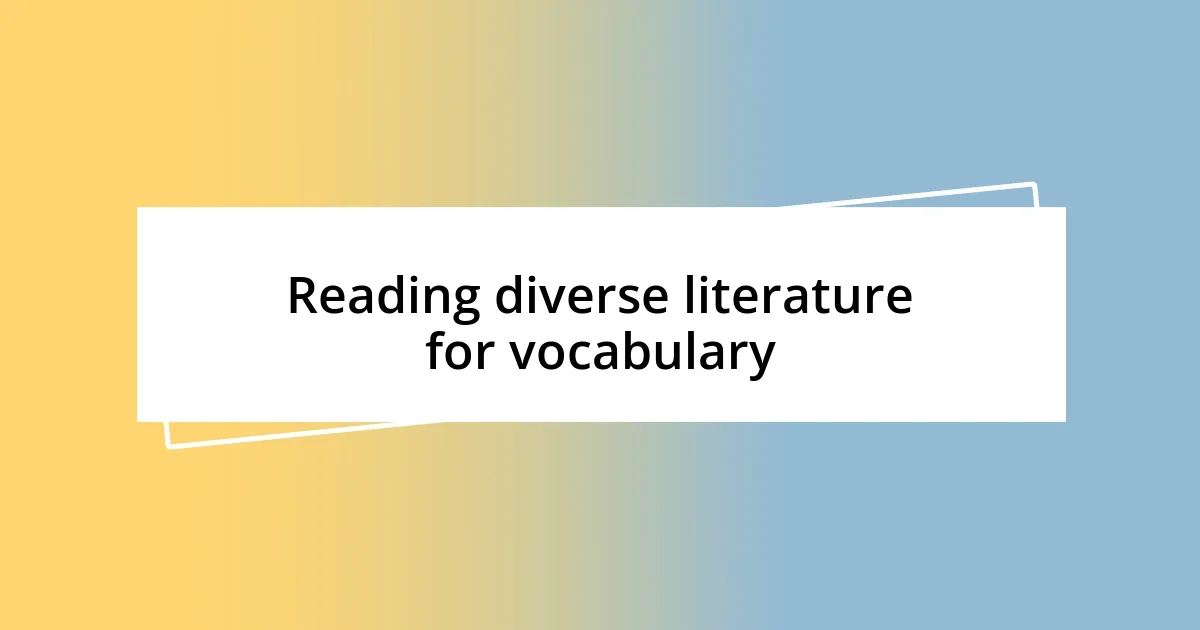
Reading diverse literature for vocabulary
Reading diverse literature has been a game changer in my vocabulary journey. I vividly recall flipping through the pages of a rich, historical fiction novel and stumbling upon words that transported me to another era. It wasn’t just about understanding their definitions; it was the experience of seeing how they fit into the tapestry of the narrative. The beauty of diverse literature is that it introduces me to various styles and contexts, allowing me to grasp the nuances of language in a way that conversations might not.
Here are a few key takeaways from my experience with diverse literature and vocabulary expansion:
- Exposure to Different Cultures: Reading authors from various backgrounds exposes me to words specific to their cultures, enriching my understanding and appreciation of language.
- Varied Styles and Genres: Each genre—from poetry to science fiction—brings a unique vocabulary that can spark my curiosity and prompt me to explore unfamiliar terms.
- Contextual Learning: Encountering new words in context helps me understand their meanings more profoundly, as I see how they are used creatively and effectively.
- Inspiration for Creative Expression: Diverse narratives often ignite my creativity, inspiring me to experiment with new words in my writing and conversations, making my language more expressive.
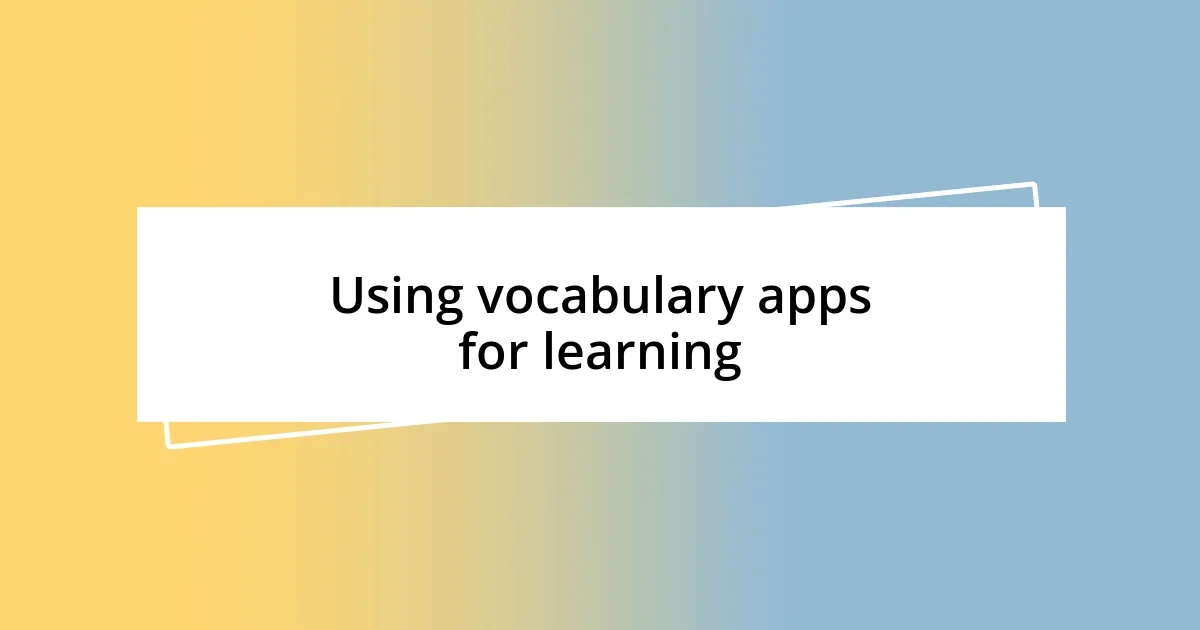
Using vocabulary apps for learning
Using vocabulary apps for learning has been an exciting adventure for me. I remember when I first downloaded an app that gamified the process of learning new words. The combination of points, levels, and friendly competition with friends kept me engaged and motivated. It transformed what could feel like a tedious task into something enjoyable and interactive. Have you ever found that learning becomes much easier when it feels like a game?
As I delved deeper into various vocabulary apps, I noticed how they cater to different learning styles. Some apps use flashcards, while others incorporate quizzes or even audio pronunciations, helping users grasp nuances in meaning and pronunciation. I found that for someone like me—who often learns best through auditory means—having the option to hear words pronounced correctly was a game-changer. Which features do you think would support your learning style the best?
Finally, I appreciate how these apps allow me to track my progress over time. Seeing my vocabulary grow and being reminded of words I once struggled with gives me a sense of accomplishment. Reflecting on my journey, I find that the instant feedback offered by these apps encourages me to challenge myself further. It’s a remarkable feeling to realize that my vocabulary is expanding, and I can confidently incorporate those new words into my life.
| App Name | Features |
|---|---|
| Duolingo | Gamified learning, quizzes, spaced repetition |
| Anki | Customizable flashcards, multimedia integration |
| Merriam-Webster | Word of the day, quizzes, pronunciation guide |
| Quizlet | Collaborative learning, varied study modes, games |
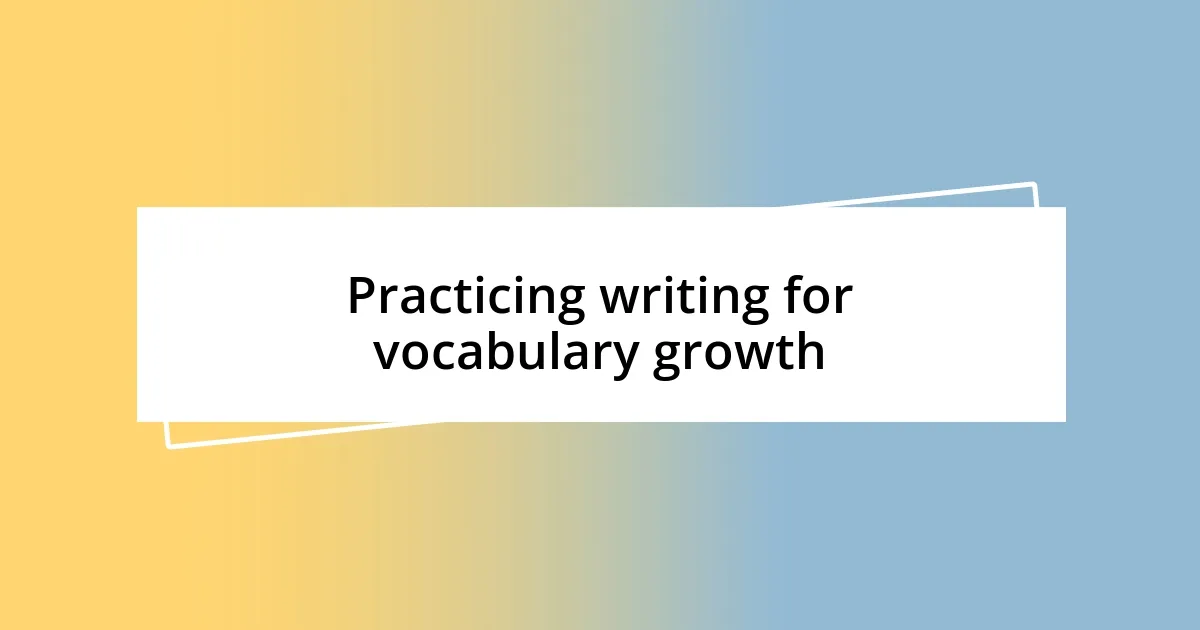
Practicing writing for vocabulary growth
Practicing writing has been a crucial element in my vocabulary growth. I clearly remember a time when I committed to journaling daily, which forced me to confront unfamiliar words. Each entry became an opportunity for me to stretch my linguistic skills. I’d often pause mid-sentence, eager to find the perfect word to express my thoughts, even if it took longer to write. Isn’t it fascinating how the act of searching for just the right term can unlock deeper levels of understanding about both language and oneself?
When I tried writing poetry, a different kind of magic unfolded. I was compelled to play with sounds and meanings, discovering delightful and unexpected connections between words. For instance, the word “serendipity” danced off my pen as I contemplated life’s happy accidents, turning a mundane moment into something profound. This playful exploration transformed my relationship with language; I began to view words not just as tools for communication but as vibrant elements of creativity and emotion.
Moreover, sharing my writing with others through workshops opened up an entirely new realm of vocabulary enrichment. Feedback on my work often came with suggestions for word alternatives or phrases I’d never considered. It was a humbling experience—like being handed a treasure map filled with paths I hadn’t traversed. This collaborative process taught me that expanding my vocabulary isn’t just a solitary journey; it thrives in connection. Have you ever thought about how sharing your words with others can introduce you to vocabulary you might not encounter on your own?
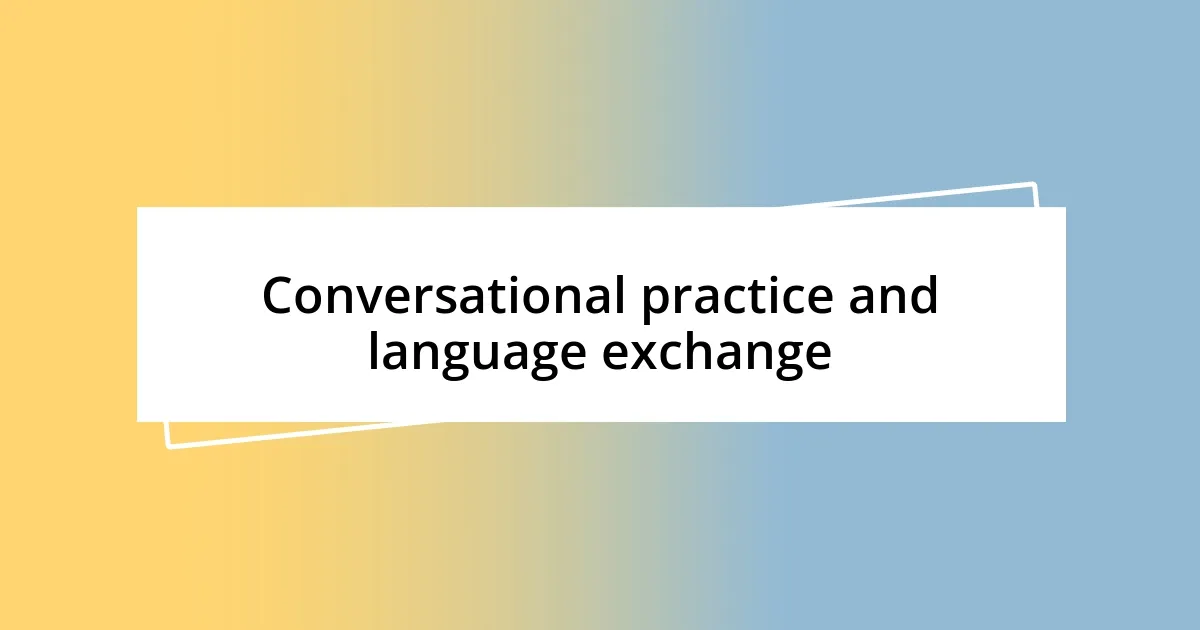
Conversational practice and language exchange
Engaging in conversational practice and language exchange has undeniably enriched my vocabulary journey. I vividly recall my first language exchange partner, who was as enthusiastic about learning English as I was about practicing Spanish. Their insightful corrections and suggestions opened my eyes to nuances I had never considered before. Have you ever been in a conversation that shifted your perspective on a word or phrase entirely?
The thrill of exchanging languages with someone also lies in the cultural insights that come along with it. I distinctly remember a moment when my partner explained a phrase in Spanish that had no direct English equivalent. It was not just about the vocabulary; it was about the cultural context behind it. This experience taught me how language is deeply intertwined with identity and traditions, making the learning process feel more personal and impactful. Don’t you think it’s fascinating how a single expression can reveal so much about a culture?
Additionally, incorporating conversational practice into my routine has helped to solidify new vocabulary in a way that traditional study methods sometimes cannot achieve. For instance, using newly learned words in real conversations made them stick in my mind. The words became less like abstract symbols and more like familiar friends I could rely on during discussions. Have you found that speaking aloud helps you remember vocabulary better? It’s remarkable how that active engagement transforms learning into a memorable experience.
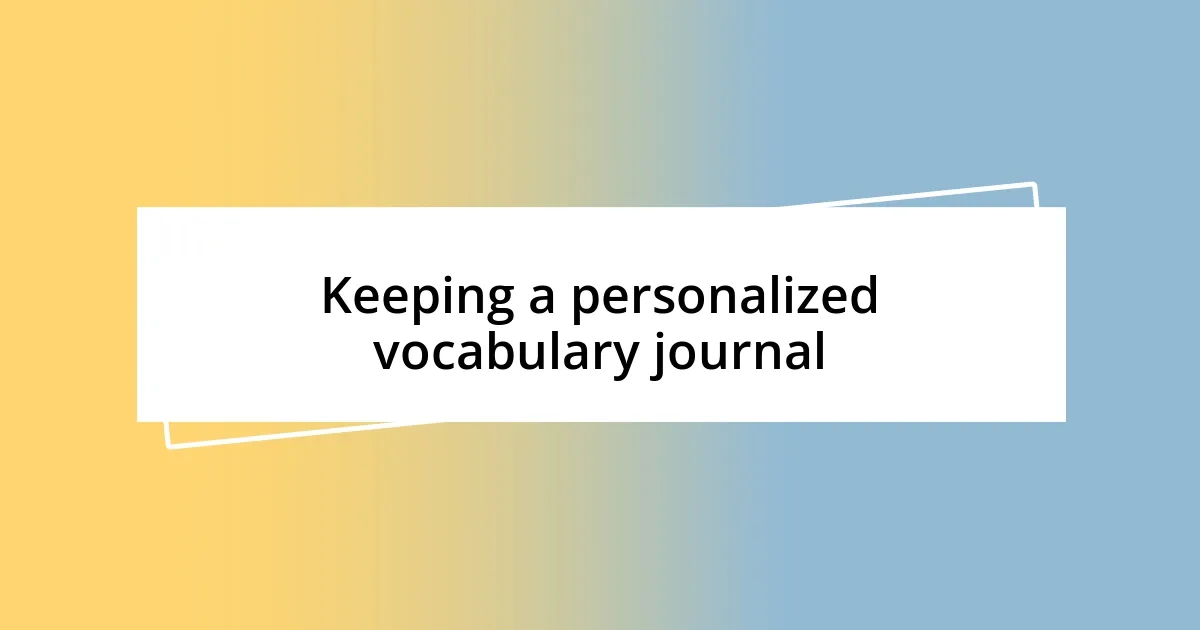
Keeping a personalized vocabulary journal
Keeping a personalized vocabulary journal has been one of the most rewarding strategies in my language journey. I still recall the sense of achievement I felt after writing my first entry; it consisted of just a handful of new words accompanied by my thoughts. As I continued filling the pages, I discovered patterns in my usage that illuminated my writing style and even my personality. It’s almost like peering into your own mind, isn’t it?
When I stumbled upon a word I particularly liked—such as “ineffable”—I didn’t stop at just writing it down. I jotted down an example sentence or a quick story where I could envision that word coming alive. This practice not only ingrained the word in my memory but also made me genuinely appreciate its nuances. Have you ever found a word that made you feel a certain way just by reading it? That’s the magic of a personalized journal; it captures not only the words but the emotions tied to them.
Revisiting my vocabulary journal is like flipping through a scrapbook filled with linguistic treasures. Every time I leaf through those pages, I feel a renewed energy to experiment with those words in my writing or conversations. I recall a moment when I used “quintessential” during a discussion about movies, and I could see the spark of interest in my friend’s eyes. The joy in knowing that I had introduced a new term to someone else feels like a shared victory. Can you relate to that invigorating feeling? It’s truly empowering to witness the growth that emerges from such a simple yet effective practice.












